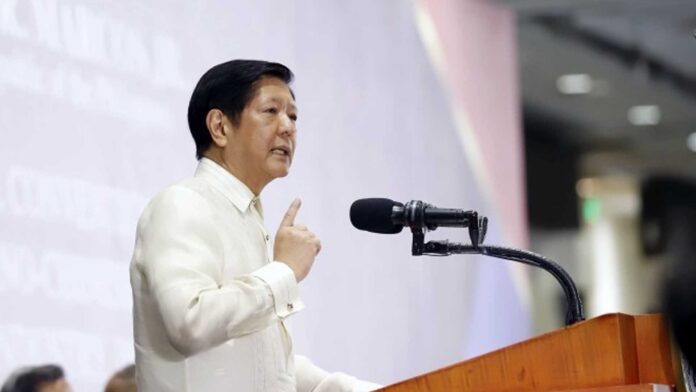President Ferdinand R. Marcos Jr. on Wednesday said the government must tackle malnutrition by mobilizing the local government units (LGUs) to achieve health and nutrition outcomes with a national impact.
During the launch of the Philippine Multisectoral Nutrition Project (PMNP) held at the Manila Hotel, Marcos said the nutrition project will incentivize the participating LGUs to ensure “last mile” delivery.
“We have found a way to bring the LGUs in. Because it is without their partnership, we do not get to what is often referred to as the last mile. And that is always the problem when you try to translate a program from the national level, a program of national government, all the way down to the local government, down to the barangay level,” he said.
“And this was – the effort that we have done now I think addresses that problem which will contribute to the success of what we are trying to do and improve the nutrition map of the Philippines,” he added.
Marcos said health care is not a priority of LGUs “simply because there’s little capacity and ability and skills and manpower at the local level to be able to achieve all the threshold levels” of health care and nutrition, which are important to the solution of malnutrition.
Citing the recent Expanded National Nutrition Survey (ENNS), which took note of the high incidence of stunting and other health issues among Filipino children, Marcos said malnutrition is linked to long-term adverse developmental impacts –taking its toll on the people’s learning ability, academic performance, all the way to productivity and employment opportunities— as well as hereditary implications.
Like the problem of food security, these related nutritional issues are also critical and fundamental to the Philippine socio-economic development, he said.
Marcos said the major nutrition project is a strategic government intervention adopting a “multi-sectoral community participatory approach”.
“It is important because such an approach is seen to be the effective method to deal with this multi-faceted problem, the benefits from which we will feel all the way from the very top of our society down to the grassroots-level,” he said.
The PMNP, a four-year project spearheaded by the Department of Health (DOH) and the Department of Social Welfare and Development (DSWD), is geared towards adopting a bold multi-sectoral approach to achieve nutrition-specific and nutrition-sensitive interventions across various LGUs.
The initiative joins together the DOH, the DSWD, the DA, the National Nutrition Council, the Department of Science and Technology-Food and Nutrition Research Institute (DOST-FNRI), as well as LGUs from Luzon to the Bangsamoro Autonomous Region in Muslim Mindanao (BARMM).
The project, Marcos said, would deliver services straight to the LGUs needing intervention in the form of primary healthcare support and nutrition services, including Early Childhood Care and Development services, on top of access to clean water and sanitation, technical information, training and financing, among other facets.
“We are counting on our LGUs’ full support and our people’s cooperation to guarantee the success of the PMNP,” he said.
Marcos also recognized the World Bank for providing the crucial funding assistance to make the project a reality.
Citing the international financial institution, the President said investing in nutrition promises highest returns, making it one of the best value-for-money development actions.
To further address malnutrition in the country, Marcos once again called on the DOH to collaborate with other concerned government agencies in harmonizing and effecting sound diet and nutritional policies and practices for the people.
The government, he said, must continue to exert the best efforts to ensure well-orchestrated and coordinated strategy to implement not only the PMNP but all related nutritional programs throughout the country to be able to get a maximum effect for all government efforts.
Marcos thanked lawmakers for their assistance in the nutrition project by helping the administration develop and enshrine into law policies that will help eradicate malnutrition and uplift the standards of primary health care and nutrition in the Philippines.
“As the country continues to face persistent threats of hunger and malnutrition, rest assured that this administration is working conscientiously to find effective and cross-cutting solutions to address these and other paramount social problems and concerns,” the President said. (PNA)






